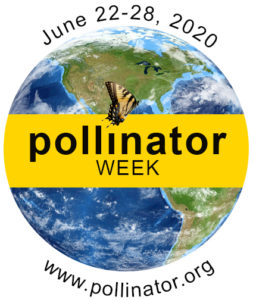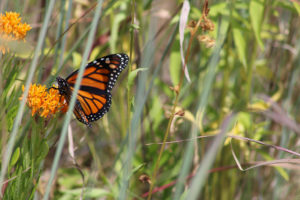National Pollinator Week: Pollinators and the OTG Program
 The week of June 22-28, 2020 has been designated as National Pollinator Week. Thirteen years ago, the United States Senate unanimously approved that one week in the month of June be used to both celebrate pollinators and bring attention to their rapidly declining populations. Since the inception of National Pollinator Week, the initiative has grown into an international celebration that highlights the growing efforts to protect pollinators and their habitat. National Pollinator Week was initiated by the Pollinator Partnership, and this organization continues to manage all related efforts.
The week of June 22-28, 2020 has been designated as National Pollinator Week. Thirteen years ago, the United States Senate unanimously approved that one week in the month of June be used to both celebrate pollinators and bring attention to their rapidly declining populations. Since the inception of National Pollinator Week, the initiative has grown into an international celebration that highlights the growing efforts to protect pollinators and their habitat. National Pollinator Week was initiated by the Pollinator Partnership, and this organization continues to manage all related efforts.
Pollinators are critical to healthy ecosystem function and the well-being of humans and wildlife alike. Bees, butterflies, moths, flies, beetles, birds, bats and other small mammals are all pollinators. According to Pollinator Partnership and the United States Fish and Wildlife Service (USFWS), these species help pollinate more than 75% of all flowering plants and nearly 75% of all crops. Additionally, pollinators are responsible for providing one out of every three bites of food you take each day.
The On the Ground (OTG) program welcomes the opportunity to highlight the birds, insects, bats and other small mammals that have such a large impact on Michigan’s wildlife and agriculture. Since 2013, the OTG program and its volunteers have helped improve more than 2,000 acres of public land that benefits an abundance of wildlife, including pollinators. Specifically, more than 1,000 acres of public grassland habitat has been improved through the planting of native grasses and wildflowers and through the removal of invasive flora.
 Grasslands are home to diverse plant and animal species, which is why their management is so important. The restoration of native grasslands is a win for popular game birds like ring-necked pheasants and wild turkeys, but it also benefits pollinators and songbirds. Other components of the ecosystem like air and water are also improved when native grasslands are restored.
Grasslands are home to diverse plant and animal species, which is why their management is so important. The restoration of native grasslands is a win for popular game birds like ring-necked pheasants and wild turkeys, but it also benefits pollinators and songbirds. Other components of the ecosystem like air and water are also improved when native grasslands are restored.
When pollinators thrive, the entire ecosystem benefits. The OTG program is proud to work with Department of Natural Resources (DNR) wildlife professionals across the state on habitat projects with ecosystem-wide goals in mind that take into account both game and non-game species.
If you would like to learn more about pollinators and the Pollinator Partnership, please visit the links below.
- https://www.pollinator.org/pollinator-week
- https://www.fws.gov/pollinators/
The post National Pollinator Week: Pollinators and the OTG Program appeared first on Michigan United Conservation Clubs.
Recent Posts



